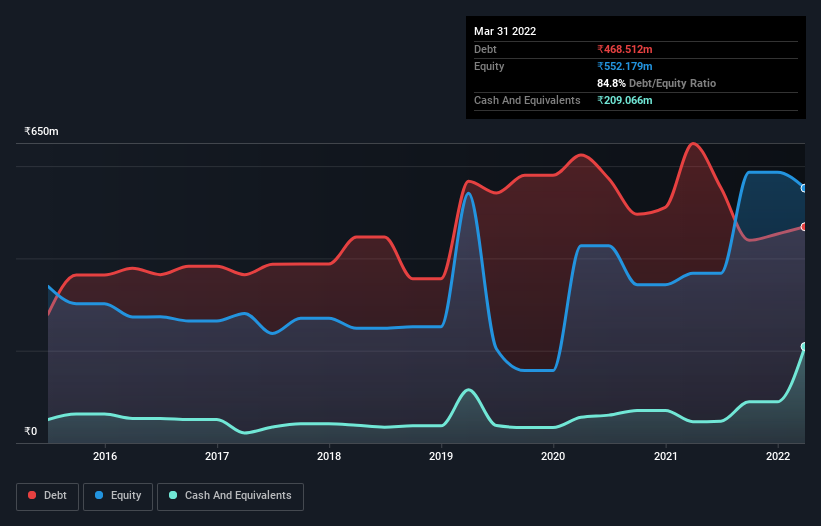
Howard Marks put it nicely when he said that, rather than worrying about share price volatility, 'The possibility of permanent loss is the risk I worry about... and every practical investor I know worries about.' So it might be obvious that you need to consider debt, when you think about how risky any given stock is, because too much debt can sink a company. We can see that Delta Manufacturing Limited (NSE:DELTAMAGNT) does use debt in its business. But the real question is whether this debt is making the company risky.
When Is Debt A Problem?
Debt and other liabilities become risky for a business when it cannot easily fulfill those obligations, either with free cash flow or by raising capital at an attractive price. In the worst case scenario, a company can go bankrupt if it cannot pay its creditors. While that is not too common, we often do see indebted companies permanently diluting shareholders because lenders force them to raise capital at a distressed price. Having said that, the most common situation is where a company manages its debt reasonably well - and to its own advantage. When we think about a company's use of debt, we first look at cash and debt together.
View our latest analysis for Delta Manufacturing
How Much Debt Does Delta Manufacturing Carry?
You can click the graphic below for the historical numbers, but it shows that Delta Manufacturing had ₹468.5m of debt in March 2022, down from ₹649.1m, one year before. However, it does have ₹209.1m in cash offsetting this, leading to net debt of about ₹259.4m.

How Healthy Is Delta Manufacturing's Balance Sheet?
According to the last reported balance sheet, Delta Manufacturing had liabilities of ₹653.2m due within 12 months, and liabilities of ₹91.5m due beyond 12 months. Offsetting this, it had ₹209.1m in cash and ₹273.0m in receivables that were due within 12 months. So its liabilities outweigh the sum of its cash and (near-term) receivables by ₹262.7m.
This deficit isn't so bad because Delta Manufacturing is worth ₹790.5m, and thus could probably raise enough capital to shore up its balance sheet, if the need arose. However, it is still worthwhile taking a close look at its ability to pay off debt. There's no doubt that we learn most about debt from the balance sheet. But you can't view debt in total isolation; since Delta Manufacturing will need earnings to service that debt. So if you're keen to discover more about its earnings, it might be worth checking out this graph of its long term earnings trend.
In the last year Delta Manufacturing had a loss before interest and tax, and actually shrunk its revenue by 15%, to ₹880m. We would much prefer see growth.
Caveat Emptor
While Delta Manufacturing's falling revenue is about as heartwarming as a wet blanket, arguably its earnings before interest and tax (EBIT) loss is even less appealing. To be specific the EBIT loss came in at ₹68m. Considering that alongside the liabilities mentioned above does not give us much confidence that company should be using so much debt. So we think its balance sheet is a little strained, though not beyond repair. However, it doesn't help that it burned through ₹128m of cash over the last year. So suffice it to say we consider the stock very risky. When analysing debt levels, the balance sheet is the obvious place to start. However, not all investment risk resides within the balance sheet - far from it. We've identified 4 warning signs with Delta Manufacturing (at least 2 which are significant) , and understanding them should be part of your investment process.
If you're interested in investing in businesses that can grow profits without the burden of debt, then check out this free list of growing businesses that have net cash on the balance sheet.
New: Manage All Your Stock Portfolios in One Place
We've created the ultimate portfolio companion for stock investors, and it's free.
• Connect an unlimited number of Portfolios and see your total in one currency
• Be alerted to new Warning Signs or Risks via email or mobile
• Track the Fair Value of your stocks
Have feedback on this article? Concerned about the content? Get in touch with us directly. Alternatively, email editorial-team (at) simplywallst.com.
This article by Simply Wall St is general in nature. We provide commentary based on historical data and analyst forecasts only using an unbiased methodology and our articles are not intended to be financial advice. It does not constitute a recommendation to buy or sell any stock, and does not take account of your objectives, or your financial situation. We aim to bring you long-term focused analysis driven by fundamental data. Note that our analysis may not factor in the latest price-sensitive company announcements or qualitative material. Simply Wall St has no position in any stocks mentioned.
About NSEI:DELTAMAGNT
Delta Manufacturing
Manufactures and sells hard ferrite magnets in India and internationally.
Mediocre balance sheet low.
Market Insights
Community Narratives



